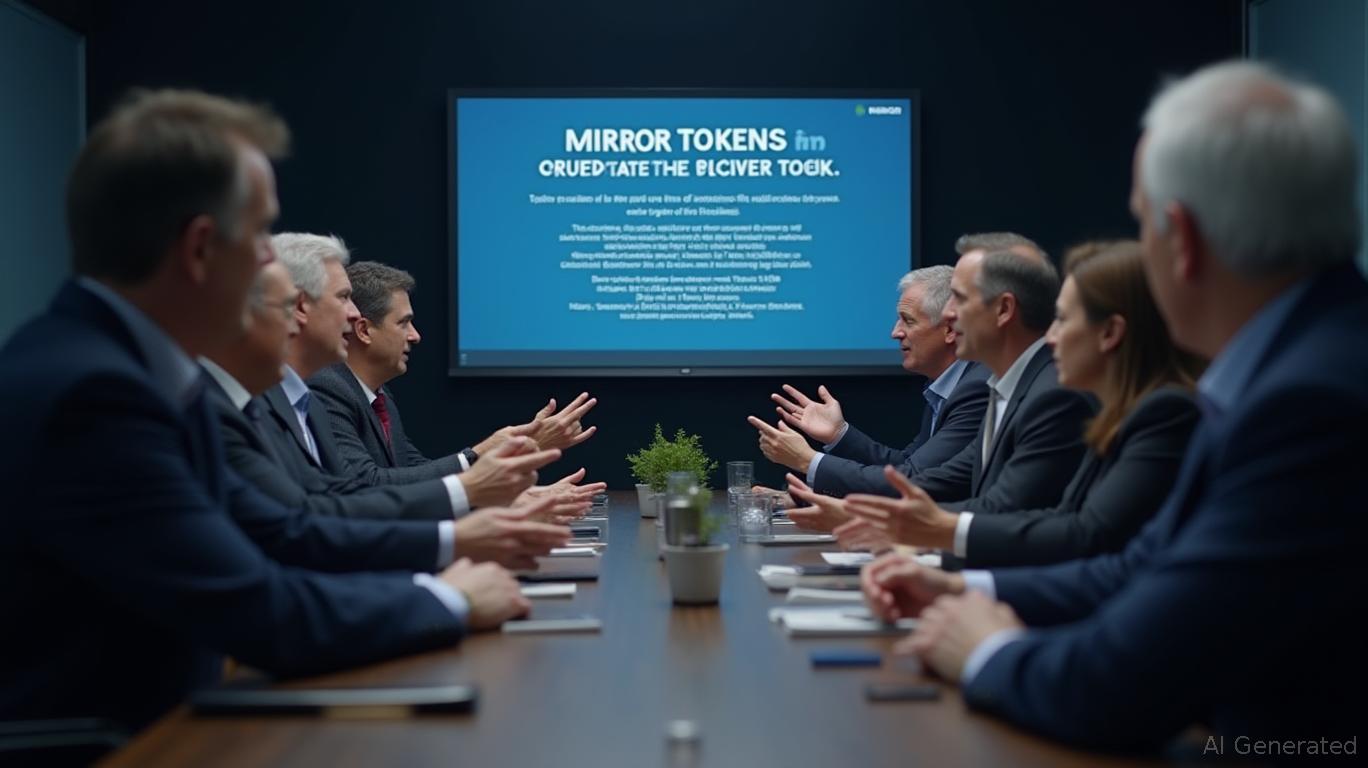Mirror Tokens: Where Cryptocurrency Innovation Aligns with Regulatory Frameworks
- SEC faces pressure to regulate tokens via structured frameworks, with Commissioner Peirce advocating "mirror tokens" as compliant innovation. - Coinbase's $375M Echo acquisition and Sonar platform exemplify regulated token sales with KYC measures, mirroring Europe's MiCA framework. - Canadian XXIX Mining's Opemiska project highlights global trends linking tokenization to clean energy incentives and tax credits. - Mirror tokens aim to resolve regulatory ambiguity by aligning digital assets with securities
The U.S. Securities and Exchange Commission (SEC) is facing mounting calls to establish a more organized approach to token oversight, with Commissioner Hester Peirce standing out as a prominent supporter of "mirror tokens" as a possible answer. Peirce, who has consistently championed both investor protection and innovation within the crypto sector, has once again voiced her backing for a system that enables asset tokenization while maintaining transparent regulatory boundaries. This initiative coincides with a wider industry movement toward compliance-focused fundraising, as seen in recent trends in token launches and growing institutional engagement.

The idea of mirror tokens—digital counterparts of conventional assets such as stocks or property—has been gaining momentum as a method to connect traditional finance with blockchain innovation. Peirce has maintained that these tokens could deliver the advantages of tokenization, including fractional ownership and round-the-clock trading, all while fitting into current regulatory systems. "Mirror tokens could open doors for progress without putting investors at risk from unregistered securities," she remarked in a recent address, according to
Peirce’s renewed push comes at a pivotal moment, as the crypto sector is experiencing a revival of structured fundraising strategies. For example, Coinbase’s $375 million purchase of Echo—a platform that facilitates regulatory-compliant token launches—has been described as a spark for a new generation of regulated initial coin offerings (ICOs). Echo’s Sonar tool, which enables founders to conduct public token offerings on blockchains like
At the same time, broader market trends highlight the necessity for a measured strategy. Nasdaq, a major force in both traditional and digital asset trading, reported varied results in October, with its indexes moving in response to strong earnings from established sectors like industrials and finance, as noted by
The momentum for organized tokenization is
Nevertheless, obstacles persist. The SEC’s previous actions against unregistered token offerings—evident in its enforcement against early ICOs—have left numerous projects uncertain about compliance. Peirce’s mirror token initiative aims to resolve this by establishing a parallel structure where digital tokens are purpose-built to meet securities regulations from the outset, a point emphasized in the CryptoNews report. While some critics worry this could hinder innovation by imposing strict standards, supporters argue it would boost investor trust and curb fraudulent activity.
As the SEC continues to balance its responsibilities of safeguarding investors and encouraging innovation, Peirce’s endorsement of mirror tokens signals a growing belief that regulatory clarity, rather than enforcement alone, is essential for the crypto industry’s long-term development. With companies like
Disclaimer: The content of this article solely reflects the author's opinion and does not represent the platform in any capacity. This article is not intended to serve as a reference for making investment decisions.
You may also like
Bitcoin News Update: Institutional Interest Fuels $90M Bitcoin ETF Inflow, Sends Price to Weekly Peak
- U.S. Bitcoin ETFs saw $90.6M net inflows on Oct 24, ending outflows with Fidelity's FBTC ($57.9M) and BlackRock's IBIT ($32.7M) leading. - Ethereum ETFs added $141.7M on Oct 22, driven by FETH ($59.1M) and ETHA ($42.5M) as regulatory clarity boosts institutional demand. - SEC reviews 155 crypto ETF filings while BlackRock's IBIT ($65.3B historical inflows) drives Bitcoin price to $114,000, a 7-day high. - ETF assets now represent 6.78% of Bitcoin's market cap ($149.96B), reflecting maturing institutional

YFI Drops 2.52% Over 7 Days as Market Fluctuates
- YFI fell 0.23% in 24 hours, with a 2.52% 7-day decline, indicating a prolonged bearish phase driven by market dynamics and investor sentiment. - Analysts predict the downward trend may persist amid macroeconomic uncertainties and lack of positive catalysts, worsening selling pressure and confidence. - Technical indicators like RSI and MACD reinforce the bearish outlook, though oversold levels may not signal a reversal in volatile assets. - A backtest is being conducted to evaluate historical recovery pat
ZEC Falls by 1.23% Over 24 Hours Despite Varied Performance Over the Past Month
- Zcash (ZEC) fell 1.23% in 24 hours to $266.96 amid broader crypto market weakness, but remains up 258.77% in 30 days. - The decline reflects October's bearish trend driven by geopolitical tensions and regulatory uncertainty, not fundamental shifts in ZEC adoption. - Analysts note ZEC's price remains above key $250 support with bullish technical indicators, suggesting potential for renewed upward momentum before major macroeconomic events.
AI and cloud technologies drive the advancement of BAYC's metaverse
- BAYC re-enters metaverse via AI/cloud partnerships with Microsoft, AMD, and Alphabet to build dynamic virtual worlds. - Tech giants' AI/cloud investments (e.g., Nvidia +56% revenue) enable real-time avatars and generative content in BAYC's ecosystem. - Regulatory challenges like Florida's Roblox subpoenas prompt BAYC to adopt AI moderation and age-verification tools. - Market rally (Nasdaq +19%, AMD +80%) underscores AI-driven metaverse potential, with 38/47 analysts rating Nvidia a "Buy".
